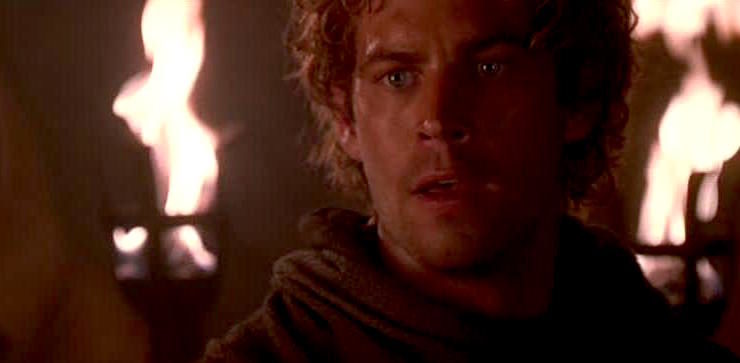A reader suggested I review the 2003 movie Timeline. I agreed, mostly because I couldn’t remember anything about the film.
That should have been a clue.
Let me start with the conclusion: Don’t watch this movie. In fact, you’d probably do well not to even bother reading this review. Because it’s bad, people. (The movie, not the review. I hope.)
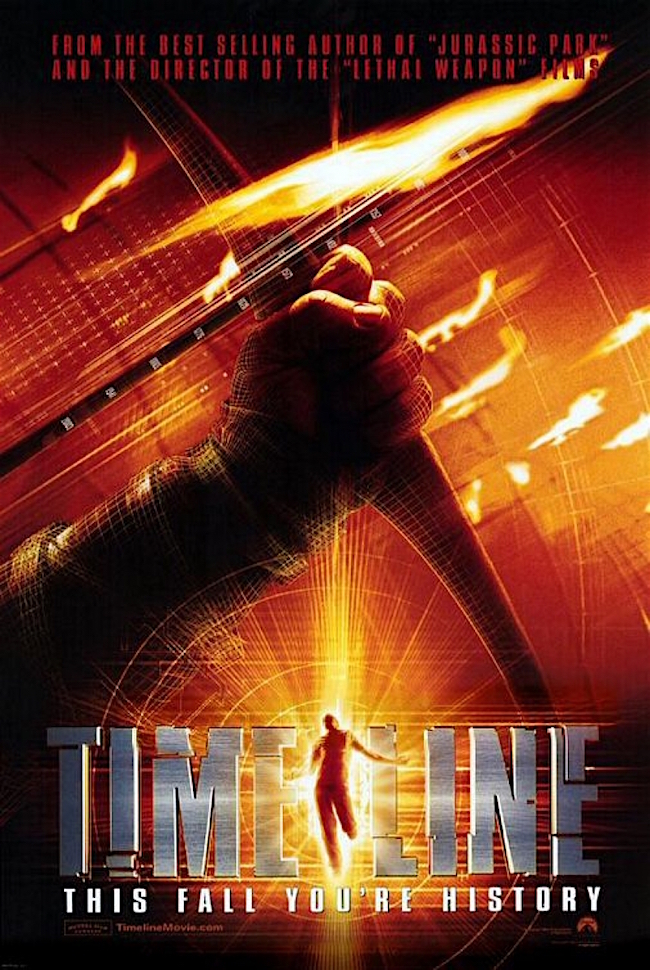
And it’s a bummer. Timeline should be a good movie. I recall the 1999 book by Michael Crichton being decent enough, the director was usually solid (Richard Donner), and the film had a pretty terrific cast on paper. Plus, you know, the Middle Ages.
But oh how it fails.
Here’s the setup:
It’s the present day, and Professor Edward Johnston (played by the ever-wonderful Scotsman Billy Connolly) is running an archaeological dig near the village of Castelgard, France. He’s got a group of students and fellow archaeologists with him, including Marek (Gerard “This is Sparta!” Butler) and Kate (Frances O’Connor). His son Chris (Paul Walker) is also visiting. The dig is sponsored by a super-rich dude named Robert Doniger (David “Lupin” Thewlis), who seems to know way more about the site than he should. The good professor heads to Doniger’s headquarters to find out why, and a few days later the archaeologists find the professor’s eyeglasses in a previously undisturbed part of the dig, along with a note from him asking for help … dated 1357.
Adventure ensues, as it turns out that Doniger has built a machine that opens a wormhole back to Castelgard in 1357: a village caught between French and English armies in the middle of the Hundred Years War, just at the moment before there’s a big climactic battle. The professor has gone back in the machine and been trapped there. When the students head back to save him all hell breaks lose.
See? That should be a really great movie.
Yet it totally and positively is not.
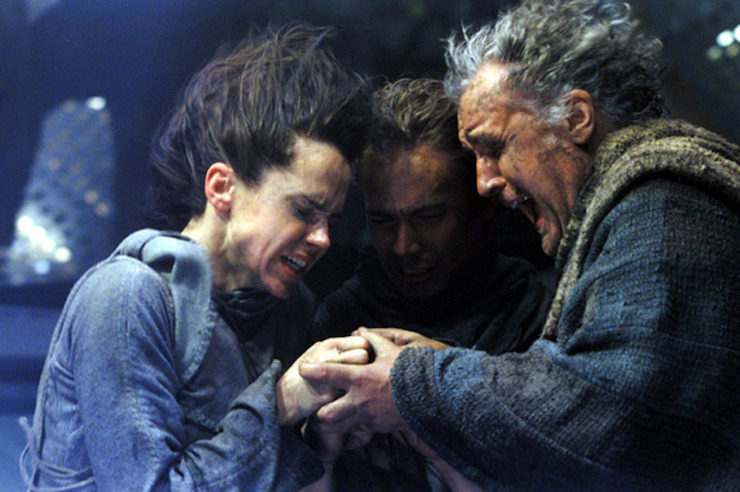
I’ll get into the history issues in a moment, but first I have to say this movie fails in every way a film can fail. The acting is wooden. The pacing is uneven. The cinematography is often ill-conceived. The lighting is bad. The tone ranges wildly from cheesy humor to solemnity, often within the same scene. The foreshadowing is of the beat-over-the-head variety. The time machine—which should totally be a cool effects thing in a movie like this—consists of two-way mirrors and actors screaming in slow-mo. The “timeline” of their “fixed” wormhole is a plothole. Hell, the crew couldn’t even manage consistency with their own terms: on at least one computer screen early on Castelgard is misspelled “Castlegard.”
The history is terrible, too, even though it’s supposed to be set in our very real past. Castelgard isn’t a real place. It’s intended to fit more or less (mostly less) into the real Dordogne Valley in France, but Crichton (and thereby the filmmakers) decided to just make it all up. The castle isn’t real. Nor is the abbey or the battle or the characters or…look, this isn’t a movie for history buffs.
The only (semi-)redeeming part of the film is a big climactic siege/battle at night. And the best part of that sequence is unquestionably when both sides send up volleys of flaming arrows. (Flaming arrows were way less common than Hollywood would have you think, FYI.) Donner and company film the volleys passing each other against the night sky and some of the arrows actually hit each other and fall out of the sky (here’s a short clip of the scene). Despite the used-up burning arrow trope, it’s a moment of physical truth that serves as a reminder to how the purity of CGI can lose some of the randomness of real life.
Still, as fun as the big fight (sorta) is, it looks almost silly compared to the magnificence of such scenes in Lord of the Rings.
Speaking of that semi-decent barrow scene, you’ve heard of the “butterfly effect,” yes? (If not, you should probably go review Ray Bradbury’s 1953 short story “A Sound of Thunder” right now.) This movie, more than any non-spoof time-travel movie I’ve ever seen, completely and totally disregards this most basic principle of time travel: don’t mess things up, because little changes can have big effects. Instead of walking softly, our (ahem) “heroes” waltz around swinging big sticks. In fact, a major plot point (spoiler alert, though it doesn’t matter since you will not be watching this film), hinges on the fact that Professor Johnston has been captured by Lord Oliver d’Vannes (played by Michael Sheen); in order to save his life, the professor creates Greek Fire for the English to use against the French in the big battle at the end.
Greek friggin’ Fire.
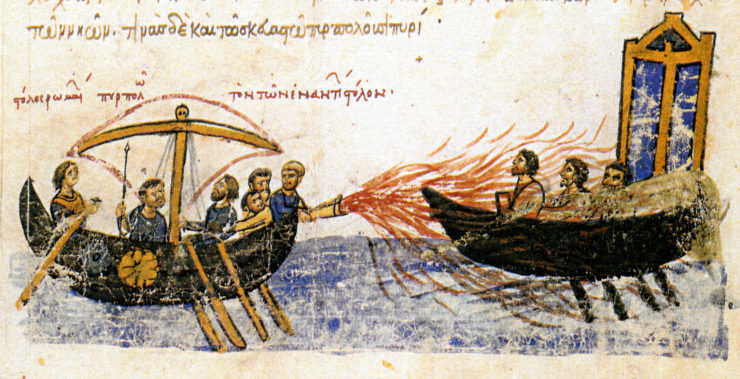
I’ll set aside the fact that it’s highly improbable that your average archaeologist bloke knows how to make Greek Fire on the fly in 14th-century France—scholars are still not sure what recipe the Byzantines really used—because that issue almost doesn’t matter when set beside the butterfly effect problem. Ol’ Professor Johnston isn’t accidentally stepping on a butterfly here. He’s stepping on the butterfly and then setting it on bloody fire, along with a whole host of French fellows who otherwise might have lived, thank you very much.
And even that wasn’t the thing that bothered me the most.
If you’ve read my review of The 13th Warrior (also based on a Crichton novel), you know that I was tremendously pleased with how that film dealt with the very real language issues of the Middle Ages.
Timeline makes a gesture at this problem when our (ahem) heroes encounter medieval French folks and have to speak with them in French. That’s great, except that, well, they’re all talking in Modern French as if everything is hunky-dory.
It ain’t.
There’s a world of difference between the languages of the 14th century and their modern equivalents, and the film just blithely ignores it.
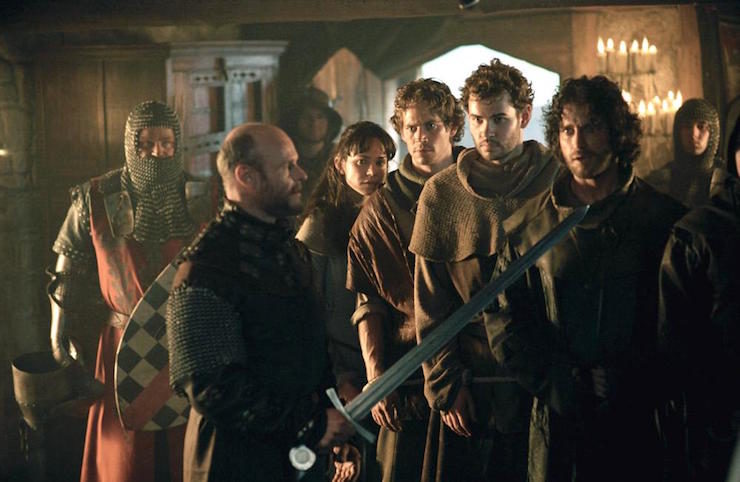
I mean, it’s bad enough that they really ought to be doing a particular medieval dialect given where they are, but it’s oh-so-much worse that the film just ignores language change over so many years. It’s especially noticeable when our heroes are in the camp of the medieval English folks and they talk just like modern English folks.
Oh, they all have British accents of one variety or another, but that’s not the same thing, Mr. Director.
For crying out loud, Chaucer is a teenager when this is happening. Do you think he and surfer-boy Paul Walker could have just chatted without any translation issues at all?
Walker: Like, what’s up, Geoff?
Chaucer: If ye art spekynge to me, ich understond ye noght.
Speaking of Paul Walker, he delivers the line that almost made me choke on the liquid I was imbibing through this movie:
“The way I see it, we’ve got what, we’ve got 650 years of knowledge on these guys. If we put our heads together, there’s no reason why we shouldn’t be able to get out of here and home in 20 minutes.”
Hahahaha. Yep. Because your ability to use a phone or drive a car is gonna be soooo applicable in the fourteenth century.
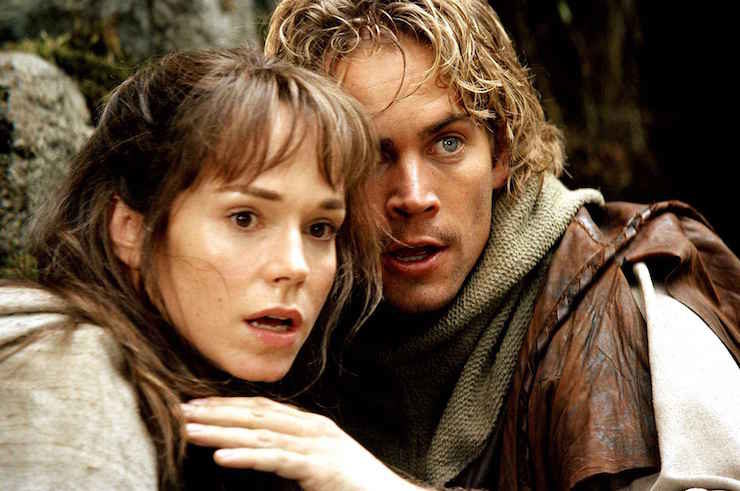
In conclusion, Timeline is one of those movies that’s so bad that it actually inspires critics to entertain themselves—so they don’t blind themselves by ballpoint in the theater, I imagine—by creating great pull-quote descriptions. Here are two of my favorites:
Resembles a Star Trek episode by way of Scooby-Doo. —Ann Hornaday
It’s like Back to the Future without the laughs. —Richard Roeper
Seriously: I do not suggest you see this film. It’s not even a good bad movie. (For that, see my review of The Norseman, which is still my leading contender for worst Viking film ever made.)
 Michael Livingston is a Professor of Medieval Literature at The Citadel who has written extensively both on medieval history and on modern medievalism. His historical fantasy series set in Ancient Rome, The Shards of Heaven and its sequel The Gates of Hell, is available from Tor Books.
Michael Livingston is a Professor of Medieval Literature at The Citadel who has written extensively both on medieval history and on modern medievalism. His historical fantasy series set in Ancient Rome, The Shards of Heaven and its sequel The Gates of Hell, is available from Tor Books.










